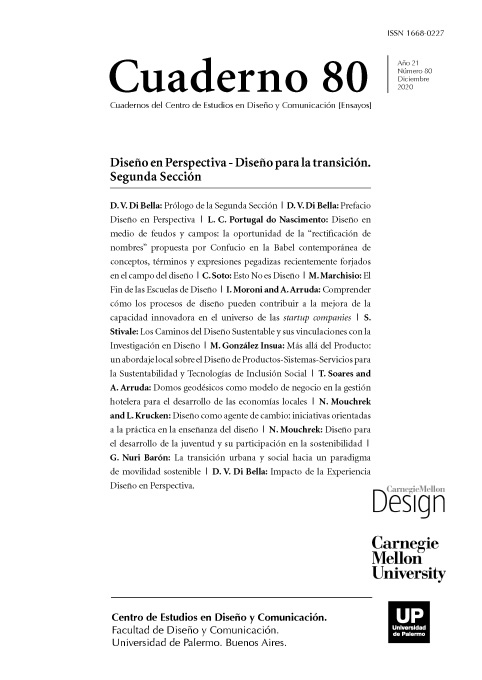Design as an agent of change: Practice-oriented initiatives on Design Teaching
Resumen
El artículo analiza el papel del Diseño como agente de transformación social frente a desafíos complejos. Abrazar intencionalmente la complejidad de la realidad y centrarse en los valores humanos, el enfoque de Diseño es adecuado para desarrollar perspectivas alternativas y estrategias de cambio radicalmente diferentes. El documento explora la enseñanza de Diseño centrándose en el cambio social y la transición a la sostenibilidad, presentando tres iniciativas y reflexionando sobre los métodos y los impactos de la aplicación del Diseño para la transición. El análisis señala la necesidad de una visión crítica en la investigación y enseñanza del diseño y la importancia de sistematizar y enseñar métodos y herramientas para apoyar la interacción entre los diversos actores sociales.
Citas
Archer, B. (1979).‘The three Rs’ Design Studies. v. 1, n.1.
Banerjee, B. (2008). Designer as Agent of Change. A Vision for Catalyzing Rapid Change. Changing the Change Conference, Torino.
Cardoso, R. (2012). Design para um mundo complexo. São Paulo: Cosac Naify.
Cross, N. (1982). Designerly ways of knowing. Design Studies, London, v. 3, n. 4, p. 221-227.
Cross, N. (1999). Design Research: A Disciplined Conversation, Design Issues, v.15, n. 2. Del Gaudio, C.; Oliveira, A. J. de; Franzato, C. (2014); “O Tempo no Design Participativo”, p. 957-969 . In: Anais do 11º Congresso Brasileiro de Pesquisa e Desenvolvimento em Design [= Blucher Design Proceedings, v. 1, n. 4]. São Paulo: Blucher, 2014. DOI 10.5151/designpro-ped-00372
Friedman, K. (2000). Creating design knowledge: from research into practice. In: IDATER 2000 CONFERENCE, 2000, Proceedings. Loughborough: Loughborough University.
Friedman, K. (2012). Models of Design: Envisioning a Future Design Education. Visible Language 46.1/2.Available at: https://www.academia.edu/2508775/Friedman._2012._Models_of_Design. Accessed on 07/14/2016.
Irwin, T. (2015). Transition Design: A Proposal for a New Area of Design Practice, Study, and Research. Design and Culture, 7(2), 229-246.
Irwin, T.; Kossoff, G.; Tonkinwise, C.; Scupelli, P. (2015) Transition Design: An Educational Framework for Advancing the Study and Design of Sustainable Transitions, 6th International Sustainability Transitions Conf., University of Sussex, UK. Available at: http://design.cmu.edu/sites/default/files/Transition_Design_Monograph_final.pdf. Accessed on 10/08/2017.
Krucken, L. (2008) Skills for design in contemporary society. In: Moraes, D.; Krucken, L. (ed.) Design and tranversality Belo Horizonte: Santa Clara. Available at: https://www.academia.edu/12809560/Skills_for_design_in_contemporary_society. Accessed on 07/14/2016.
Krucken, L.; Mol, I. (2014). Abordagens para cocriação no ensino de design: reflexões sobre iniciativas no contexto da graduação e da pós graduação, p. 992-1000. In: Anais do 11º Congresso Brasileiro de Pesquisa e Desenvolvimento em Design [Blucher Design Proceedings, v. 1, n. 4]. São Paulo: Blucher, DOI 10.5151/designpro-ped-01062
Landry, C. (2000). The Creative city. A toolkit for Urban Innovators. Earthscan Publications LTD, London UK.
Malaguti, C. (2009). Design e valores materializados - cultura, ética e sustentabilidade. In: Cadernos de Estudos Avançados em Design Sustentabilidade I. 1 ed. Barbacena: EdUEMG, v.1.
Manzini, E. (2008). Design para a inovação social e sustentabilidade: comunidades criativas organizações colaborativas e novas redes projetuais. Rio de Janeiro: Cadernos do Grupo de Altos Estudos, v. 1.
Manzini, E. (2015). Design, when everybody designs: an introduction to design for social innovation. London: The MIT Press.
Margolin, V. (2015). Social design: From utopia to the good society. In M. Bruinsma & I. van Zijl (Eds). Design for the good society (pp. 28-42). Utrecht, the Netherlands: Stichting Utrecht Biennale.
Moraes, D. (2010). Metaprojeto: o design do design. 1. ed. São Paulo: Blücher, v. 1.
Mouchrek, N. M. (2014). Design strategies and competences to promote the culture of sustainability among youth. State University of Minas Gerais, Brazil.
Mouchrek, N., Baum, L., & McNair, L. D. (2016). Student Persistence Through Uncertainty Toward Successful Creative Practice. In American Society for Engineering Education Annual Conference.
Mouchrek, N.; Krucken, L. (2014). Laboratório de design, cocriação e sustentabilidade: uma iniciativa no ensino de design. p. 1654-1666. In: Anais do 11º Congresso Brasileiro de Pesquisa e Desenvolvimento em Design [Blucher Design Proceedings, v. 1, n. 4]. São Paulo: Blucher, DOI 10.5151/designpro-ped-01234
Mouchrek, N. (2015). Design for Youth Empowerment. PhD project, Unpublished document.
Nelson, H.G. and Stolterman, E. (2003). The Design Way: intentional change in an unpredictable world. Educational Technology Publications, Englewood Cliffs, NJ.
Norman, D. (2010). Why Design Education Must Change. Core77, 2010 November 26, 2010. Available at: http://www.core77.com/posts/17993/why-design-education-mustchange-17993. Accessed on: 07/14/2016.
Owen, C. L. (2005). Design Thinking. What It Is. Why It Is Different. Where It Has New Value. Life and Design in the Future Conference, Keynote address. South Korea.
Rittel, H., Webber, M. (1973). Dilemmas in a General Theory of Planning. Policy Sciences 4, 2. Saboya, R. Problemas “capciosos”. Available at: http://www.urbanidades.arq.br. Accessed on: 12/14/2012.
Saikaly, F. (2005). Approaches to design research: towards the designerly way. In: The 6th International Conference of the European Academy of Design, Design System Evolution. The University of the Arts Bremen, Germany, 29-31 March 2005. Available at: http://www.verhaag.net/ead06/fullpapers/ead06_id187_2.pdf. Accessed on: 01/20/2016.
Thackara, J. In the bubble: designing in a complex world. Cambridge: MIT, 2005. Utrecht Manifest. Available at http://www.utrechtmanifest.nl. Accessed on 09/25/2016.
Los autores/as que publiquen en esta revista ceden los derechos de autor y de publicación a "Cuadernos del Centro de Estudios de Diseño y Comunicación", Aceptando el registro de su trabajo bajo una licencia de atribución de Creative Commons, que permite a terceros utilizar lo publicado siempre que de el crédito pertinente a los autores y a esta revista.


